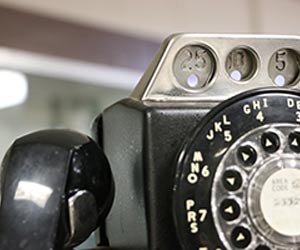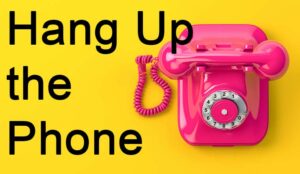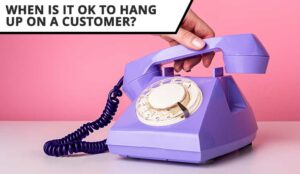Have you ever ended a call and thought about the phrase “hang up the phone”?
Even today, we continue to use this expression, despite most phones no longer having a receiver to physically “hang” on to.
This phrase has stuck around from the early days of telephony, evolving alongside our communication habits. But where does it come from, and why do we still say it?
To find out more we took a look at the origins of “hang up the phone,” how its meaning has changed over time, and the difference between “hang up” and “hung up” in conversation.
What Does “Hang Up the Phone” Mean?
“Hang up the phone” means to end or disconnect a phone call.
In the early days of corded telephones, ending a call meant placing the handset back onto the phone base, into a section called the cradle. This action physically disconnected the call.
Even as technology evolved—introducing cordless phones, mobile phones, and eventually smartphones—the term “hang up” remained in use, even though ending a call today typically involves pressing a button or tapping a screen.
What’s the Difference Between Hang Up the Phone and Hung up the Phone?
The difference between “hang up” and “hung up” lies in their grammatical use and tense.
The Meaning of Hung Up
“Hung up” is used when referring to the action that has already been completed in the past.
Examples of ‘Hung Up’ in Customer Conversations
- “I’ll process the order when you have hung up”
- “She hung up on me!”
- “The caller hung up”
- “It seems like we got disconnected earlier; it looks like the call was hung up accidentally.”
- “I apologize if you feel like you were hung up on. That’s certainly not our intention.”
- “I see that the previous call was hung up, and the issue wasn’t resolved. Let me take care of that for you.”
- “I noticed you were hung up on during the transfer. I’m sorry about that, and I’ll make sure it doesn’t happen again.”
The Meaning of Hang Up
“Hang up” is used when talking about the action in the present or giving a direct command.
Examples of ‘Hang Up’ in Customer Conversations
- “I am going to hang up the phone now”
- “If you continue to be rude, then I am going to hang up on you”
- “Please don’t hang up while I transfer you to a specialist.”
- “If you need to check something on your end, I can wait. Just don’t hang up.”
- “Once you’ve finished the survey, you can go ahead and hang up.”
- “Is there anything else I can assist you with before you hang up?”
- “Let me confirm your details first. Please don’t hang up until I’ve done that.”
The History of the Term Hang Up the Phone
The phrase “hanging up the phone” originates from the early days of telephony when ending a call involved literally hanging the receiver back on its hook.
So lets take a look at how phones have evolved and why the phrase has remained a part of our everyday language.
Early Telephones (Late 19th and Early 20th Century)

The earliest telephones, such as the ones designed by Alexander Graham Bell, were often mounted on a wall.
They featured a separate earpiece, known as the receiver, and a mouthpiece attached to the unit.
To end a call, users would physically place the receiver back onto a hook attached to the phone. This hook was connected to a switch that would disconnect the call when the receiver was placed on it.
This action was referred to as “hanging up” the phone because the receiver was literally hung back on the hook.
Evolution of Phones
As technology advanced, desk phones became more common, but the mechanism remained similar. The receiver was still placed on a cradle or hook to disconnect the call.
Even as phones became more compact, the term “hang up” persisted. The action of placing the receiver back onto its cradle remained a standard way to end calls throughout much of the 20th century.
Modern Usage
Today, with the advent of mobile phones and smartphones, the physical action of hanging up a receiver is largely obsolete.
However, the term “hang up” is still widely used to describe ending a call, even though it’s often done by pressing a button or tapping a screen.
The term has endured as part of the language, illustrating how technology can change but linguistic habits can persist.
What Does “Hang Off” the Phone Mean?
The phrase “hang off the phone” isn’t a common or standard expression in English. However, due to context there it could have a few meanings:
Delaying Hanging Up
Someone might say “hang off the phone” to mean delaying the action of hanging up or staying on the line for a little longer.
For example, if someone is about to end a call but is asked to stay on the line briefly, they might “hang off” hanging up.
Hesitation to End a Call
It could also imply a person is hesitating to hang up the phone, perhaps because they want to continue the conversation or aren’t sure if the conversation is truly over.
Informal or Regional Usage
In some regions or informal settings, people might use “hang off” to describe hanging around or staying connected on the phone.
Can a Customer Service Agent Hang Up on a Caller?
The short answer is yes, but generally only in certain circumstances.
For a comprehensive guide of how contact centres can end phone calls, read this article: When Is It OK to Hang Up on a Customer?
Author: Robyn Coppell
Reviewed by: Robyn Coppell
Published On: 4th Aug 2022 - Last modified: 28th Mar 2025
Read more about - Definitions


































